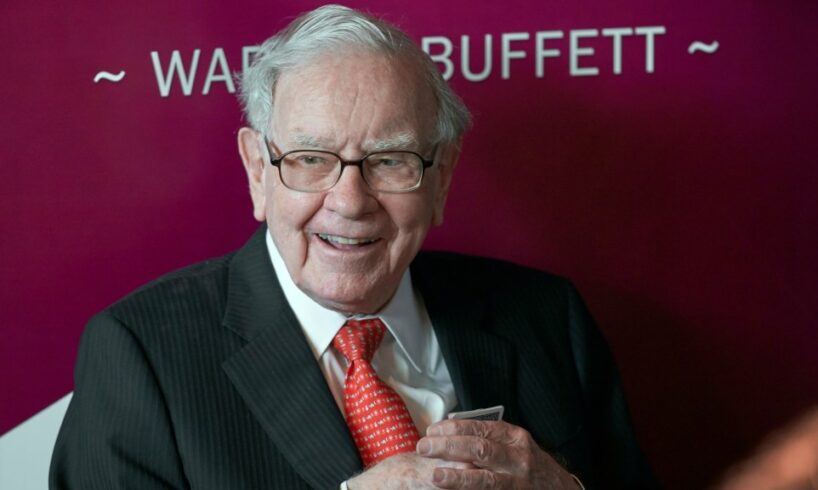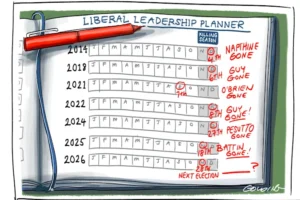
For 60 years, Warren Buffett has written an annual letter to shareholders of Berkshire Hathaway, the company he’s run since 1965.
He acquired the small textile company for US$18 a share to fire the CEO. Buffett subsequently described it as “the dumbest stock I ever bought” despite the fact that today, Berkshire Hathaway Class A shares are worth around US$748,000 (publicly traded class B shares are worth around $510), and the company delivered a compound annual growth rate (CAGR) of nearly 20%, double the market (the textile side shut down in 1985).
If you’d invested $1000 with him 60 years ago, it would be worth around $55 million today. Buffett’s personal wealth is more than US$156 billion (AU$240 billion), and he’s one of the world’s greatest philanthropists, giving his money away and plans to leave his family in charge of continuing that pleasant task.
Meanwhile, he still lives in the house in Omaha, Nebraska, that he bought in 1958 for $31,500, and drives a Cadillac XTS he bought in 2014. It takes 6-7 minutes to get from his home to the office, where he’s been for 64 years.
Related Article Block Placeholder
Article ID: 122889
Buffett, dubbed the Oracle of Omaha, considered the greatest investor of all time, and now 95, is stepping down as CEO of Berkshire Hathaway at the end of the year.
Smarter business news. Straight to your inbox.
For startup founders, small businesses and leaders. Build sharper instincts and better strategy by learning from Australia’s smartest business minds. Sign up for free.
By continuing, you agree to our Terms & Conditions and Privacy Policy.
His annual shareholder letter is the investment community version of the Sermon on the Mount, and his final one was poignant, reflective, humble, home-spun and funny. He used to fingerprint nuns, believing that one day one would turn bad and his collection would help solve the crime.
It’s also invaluable when it comes to lessons for startup founders. Here’s a little bit of Warren wisdom we thought worth sharing.
1. Remember your luck
“Those who reach old age need a huge dose of good luck, daily escaping banana peels, natural disasters, drunk or distracted drivers, lightning strikes, you name it,” Buffett, who nearly died three times, including once as a child, says.
“But Lady Luck is fickle and – no other term fits – wildly unfair. In many cases, our leaders and the rich have received far more than their share of luck – which, too often, the recipients prefer not to acknowledge.
“Dynastic inheritors have achieved lifetime financial independence the moment they emerged from the womb, while others have arrived, facing a hell-hole during their early life or, worse, disabling physical or mental infirmities that rob them of what I have taken for granted.
“In many heavily populated parts of the world, I would likely have had a miserable life and my sisters would have had one even worse.
“I was born in 1930, healthy, reasonably intelligent, white, male and in America. Wow! Thank you, Lady Luck. My sisters had equal intelligence and better personalities than I but faced a much different outlook. Lady Luck continued to drop by during much of my life, but she has better things to do than work with those in their 90s. Luck has its limits.”
2. Make mistakes and move on
Buffett is comfortable admitting he hasn’t always been at his best. His advice?
“I’m happy to say I feel better about the second half of my life than the first. My advice: don’t beat yourself up over past mistakes – learn at least a little from them and move on. It is never too late to improve. Get the right heroes and copy them.
Related Article Block Placeholder
Article ID: 326811
“Choose your heroes very carefully and then emulate them. You will never be perfect, but you can always be better.”
3. Be the person you want people to remember
Alfred Nobel, the 19th-century Swedish chemist and businessman, invented dynamite, then left his fortune as a bequest to set up the Nobel Prize. He was known as “The Merchant of Death,” and the story Buffett recounts is the apocryphal tale of newspapers accidentally publishing his obituary when his brother Ludvig had died.
“He was horrified at what he read and realized he should change his behaviour. Don’t count on a newsroom mix-up: decide what you would like your obituary to say and live the life to deserve it,” Buffett writes.
“Greatness does not come about through accumulating great amounts of money, great amounts of publicity or great power in government. When you help someone in any of thousands of ways, you help the world. Kindness is costless but also priceless. Whether you are religious or not, it’s hard to beat The Golden Rule as a guide to behaviour.”
4. Be kind to everyone
Warming to the theme, Buffett concludes with a reminder that everyone in the team is important to your success, and while you will stumble, always strive to be a better person.
“I write this as one who has been thoughtless countless times and made many mistakes, but also became very lucky in learning from some wonderful friends how to behave better (still a long way from perfect, however). Keep in mind that the cleaning lady is as much a human being as the Chairman,” he concludes.
Bonus: What went wrong with CEO pay
The debate around executive pay is nothing new, and is currently front of minds once again. Buffett makes this observation on rapacity in leadership:
“During my lifetime, reformers sought to embarrass CEOs by requiring the disclosure of the compensation of the boss compared to what was being paid to the average employee. Proxy statements promptly ballooned to 100-plus pages compared to 20 or less earlier. But the good intentions didn’t work; instead they backfired,” he wrote.
“Based on the majority of my observations – the CEO of company “A” looked at his competitor at company “B” and subtly conveyed to his board that he should be worth more. Of course, he also boosted the pay of directors and was careful who he placed on the compensation committee.
“The new rules produced envy, not moderation. The ratcheting took on a life of its own.
“What often bothers very wealthy CEOs – they are human, after all – is that other CEOs are getting even richer. Envy and greed walk hand in hand.
“And what consultant ever recommended a serious cut in CEO compensation or board payments?”
Read his full and final shareholder letter here.
This article was first published by Startup Daily.





